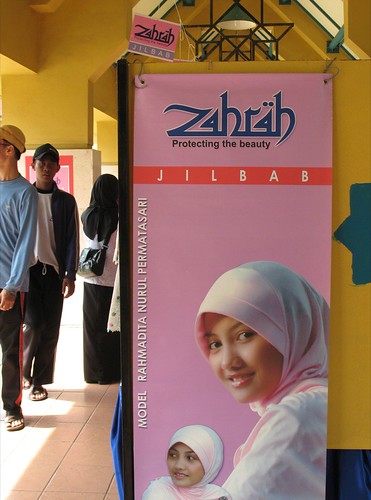 N
Not long after returning from Indonesia, I saw a little girl walking to a swimming pool wearing only a bathing suit & flip-flops. An arresting image to me after 6 months in the Islamic world.
We were in the California suburbs & it was about 95 degrees (F). She was 7 or 8 eight years old & holding her father’s hand as they strolled. She wore a brightly-colored, one-piece suit; nothing remarkable. He held her towel. She hopped a little, every fourth or fifth step—excited to swim. A simple, good image of summer. Here’s what stopped me:
To my Indonesian eye, she was effectively naked. Even after only 6 months away, this was genuinely startling to me. A spark of shock to see a child—a girl-child—undressed in public.
In more oppressive heat than this, no one in Jakarta, & certainly not a girl, walks about undressed like this. It would be scandalous & at least uncivilized. Not even boys wear shorts above the knee & high-necked tank tops, though a few women do wear them, are rare even in the cities. There’s a wide variety of dress in the metropolitan areas, but it’s not uncommon to see girls this young wearing long sleeves &
jilbab (head scarf).
Now, suddenly, a girl walking down the street in a bathing suit.But
simultaneously my first reaction was split with a happy nostalgia! Because the truth is I grew up living 2 doors away from a public swimming pool in California & was a competitive swimmer for a decade of my childhood; I ran around dressed exactly like this little girl for 3 months of the year for most of my youth. I never thought twice about it; I was sexually innocent & I was universally treated that way.
This split reaction shows me how quickly & how much we can adapt to (if not adopt) new cultural mores. But it also shows how many contradictory values we can hold in one instant.
Here’s the kicker, though:For all the surprise I felt at my own eye informing me ‘she’s undressed!’, this little girl looked strikingly INNOCENT. Specifically: she looked more innocent to my eye than the 7 year old girls I’d seen in
jilbab. Because to me—in my outsider’s first reaction—it suggests that no one looks at this kid sexually. And that it rightly doesn’t occur to the father that anyone would.
Hijab (Islamic dress in general) is complex, of course, & people wear it for many different reasons, from cultural heritage to obedience to law, from fitting in with local fashion to expressing one’s devotion to God, & so forth, but one of the many reasons one might wear hijab is to block the male gaze. Concealing clothing, argue Islamic feminists, focuses men on the content of one’s character, rather than the too-tempting curves of one’s body.
The seven year old in
hijab...I can’t know why her parents actually dressed her this way that morning, and from their perspective it may have nothing whatsoever to do with a sexual gaze. But from a distance, in general, to put a
jilbab on a child suggests that some part of the public considers her—by virtue of being female—already engaged in a sexual equation.
It’s an unfortunate irony, this reaction. In certain, important ways
we lose a measure of innocence exactly in the moment that we publicly declare it must be protected.




